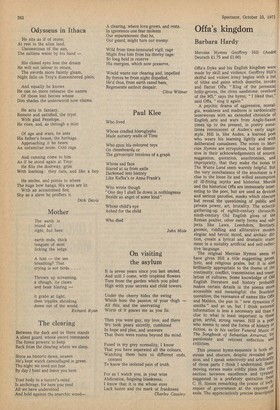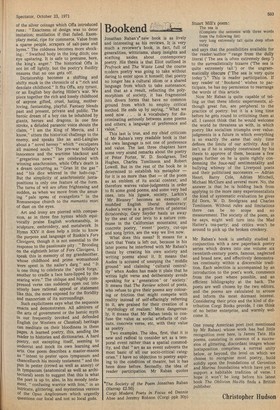Offa's kingdom
Barbara Hardy
Mercian Hymns Geoffrey Hill (Andre Deutsch £1.75 and £1.00) Offa's Dyke and his English kingdom were made by skill sand violence. Geoffrey Hill's
skilful and violent irony begins with a list of titles and gains which describe, invoke and flatter Offa. "King of the perennial holly-groves, the riven sandstone: overlord of the M5," says the hymn; "I liked that," said Offa, " sing t again." A psychic drama of aggression, nostalgia, weakness and madness is sardonically interwoven with an extended chronicle of English arts and wars from Anglo-Saxon times up to the present, in poetry some
times reminiscent of Auden's early sagastyle. Hill is, like Auden, a learned poet who wears his learning lightly and with deliberated casualness. The notes to Mercian Hymns are scrupulous, but so dismissive in their acknowledgements of source, suggestion, quotation, anachronism, and impropriety, that they make the notes to The Waste Land seem warmly helpful. But the very nonchalance of the annotater is a clue to the loose lie and willed assumption of ill-fitting myths and histories. Mercia and the historical Offa are immensely interesting to the poet, but are used as devices and serious parodies, masks which obscure but reveal the questioning of public and private power, art, brutality. The eclectic gathering-up of eighth-century chronicle, ninth-century Old English gloss of the Roman psalter, other early forms and subjects like Laws, Leechdom, BestiarY, gnomic, riddling and alliterative modes, elegiac and heroic mood, and archaic diction, create a lyrical and dramatic statement in a suitably artificial and self-reflective language.
The original Mercian Hymns seem to have given Hill a title suggesting prose, lyric, and religious praise, but it is als° brilliantly appropriate to the theme of the continuity, conflict, transmission and translation of cultures. Some knowledge of Old English literature and history probablY makes certain details in the poems more accessible and meaningful: the Boethins quotation, the resonance of names like Offo and Maldon, the pun in "new dynasties of, smiths" and so on, but I think external information is less a necessary aid than 8 clue to what is least important in these grim, artful, strong verses. Hill is a poet who seems to need the forms of history or fiction, as in his earlier Funeral Music or The Songbook of Sebastian A rrurruz, for passionate and reticent reflection an criticism.
This present hymn-sequence is both 917 struse and obscure, despite revealed Pas. sion, and I speak selectively and arbitrarilYe of those parts I think I understand. Son, moving verses make coldly plain the coly nection between excellence and tyrantlY suggested in a prefatory quotation fr0,s11! C. H. Sisson remarking the praise of niques of government at the expense "3,1 ends. The appreciatively precise descriptio of the silver coinage which Offa introduced runs : "Exactness of design was to deter imitation; mutilation if that failed. Exem plary metal, ripe for commerce. Value from a sparse people, scrapers of salt-pans and byres." The coldness becomes more shock ing: "Swathed body in the long ditch; one eye upstaring. It is safe to presume, here, the king's anger." The historical Offa is not let off lightly, but the poetry's fluidity ensures that no one gets off.
Dictatorship becomes a shifting and shifty mask in the chronicle of a "rich and desolate childhood." It fits Offa, any tyrant, or an English boy during Hitler's war. We piece together the rich and lonely childhood of anyone gifted, cruel, hating, motherloving, fantasizing, playful. Fantasy blends past and present, private and public. The heroic dream of a boy can be inhabited by giants, heroes and dragons. In one fine stroke, a deluded paranoic voice shouts the claim, "I am the King of Mercia, and I know," utters the historical challenge to the enemy, and speaks like an anti-Laingian about a "novel heresy" which "exculpates all maimed souls." The pre-war holiday's innocence and the wartime blackout and "gregarious news" are celebrated with winning anachronism, while Offa's death is a dream occurring as "Gran lit the gas" and "his dice whirred in the ludo-cup." But the simplicity of anachronistic juxtapositions is only one feature of .the form. The turns of wit are often frightening and sudden, as when we move from the amusing "pale spree of evangelists" in the Romanesque church to the memento mori of dust on the eyes.
Art and irony are pierced with compassion, as in three fine hymns which equivocally praise English workmanship, in sculpture, embroidery, and metalwork. In Hymn XXV it does help a little to know the purpose and language of Ruskin's Fors Clavigera, though it is not essential to the response to the passionate pity : "Brooding on the eightieth letter of Fors C/avigera, I Speak this in memory of my grandmother, whose childhood and prime womanhood were spent in the nailer's darg " and "It is one thing to celebrate the 'quick forge,' another to cradle a face hare-lipped by the searing wire." The oblique and highly compressed verse can suddenly open out into utterly bare rational appeal or statement like this, the more exposed for the floridity and mannerism of its surroundings.
Such explicitness says what the sequence enacts and demonstrates. All admirers of the arts of government or the heroic myth in our frequently invoked and defended English (or Western or Classical) heritage can meditate on their bloodiness in these Pages. A learned poetry, this, sending the reader to histories and dictionaries. A hard Poetry, not excepting itself, seeming to undercut and mock its own learning and arts. One poem describes a master-mason as "intent to pester upon tympanum and chancellarch his moody testament" and the Pun in pester (crowd as well as annoy) or in tympanum (anatomical as well as architectural) seem to suggest that this is what the poet is up to, also, in his moody testament, "confusing warrior with lion," in an intricate, glittering, and mysterious version of the Opus Anglicanum which urgently questions our local and not so local gods.



































 Previous page
Previous page